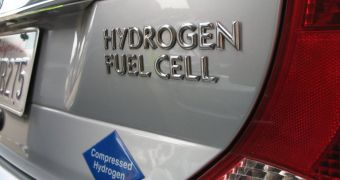For no apparent reason, it seems that instead of developing, the fuel cell technology is stagnating. A truly remarkable technology, the fuel cells, seem to promise us a lot of advantages. Gas emissions that produce the greenhouse effect could be a thing of the past, and we could exploit a good reliable renewable source of energy at relatively low cost. Nevertheless we are burning fossil fuels, like there's no tomorrow. Why is that???
Fuel cells are the result of decades of research, conducted to find alternative fuels and ways to power our hungry cars. Advances in the materials used to produce fuel cells mean that they are getting better every day at converting fuel to electric energy. Fuel cells work by combining hydrogen and oxygen molecules to produce water, and energy.
And though the solution is here, we are not doing anything to implement it anytime soon. Hydrogen fuel pumping stations are nowhere to be found, and car producers don't produce any hydrogen powered cars. The infrastructure is not developing fast enough. General Motors has launched its own Project Driveway, in which 110 Chevy Equinoxes powered by hydrogen fuel cells will be lent to customers for a 3-month test period. Also to power the cars GM will install 10 hydrogen pumping stations in Los Angeles and New York, from which the customers can fill up their tanks for free at the company's expense.
The main reason for this program triggered by GM is to get crucial feedback from the customer using the fuel cell-powered cars, but will probably hit a paradox soon, since there will be not enough hydrogen pumping stations, which will not sell very many cars. GM has invested about one billion dollars in the Project Driveway program.
On top of the other known advantages, once the fuel cell technology is fully developed, the cars could probably get a lot cheaper, since fuel cell cars are simpler to make the traditional internal combustion cars. Fuel cell powered cars do not need transmissions, or many other mechanical components. Power is transmitted directly from the electric engines to the wheels.
Hydrogen and oxygen are relatively easy to extract from water, a chemical highly abundant on Earth, and can be both obtained through electrolysis. On top of that, it will be relatively cheap to run cars on hydrogen. The only concern regarding this technology is the potential of the hydrogen, which in a rich oxygen atmosphere such as our own, can be extremely explosive.
GM says that in a period of two years, from 2010 to 2012 will release a total of 1000 fuel cell powered cars, and will build at least 40 hydrogen stations in the areas where the cars will be operating.

 14 DAY TRIAL //
14 DAY TRIAL //